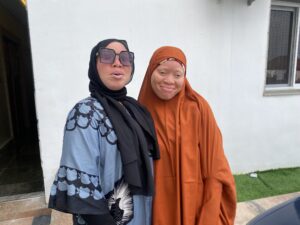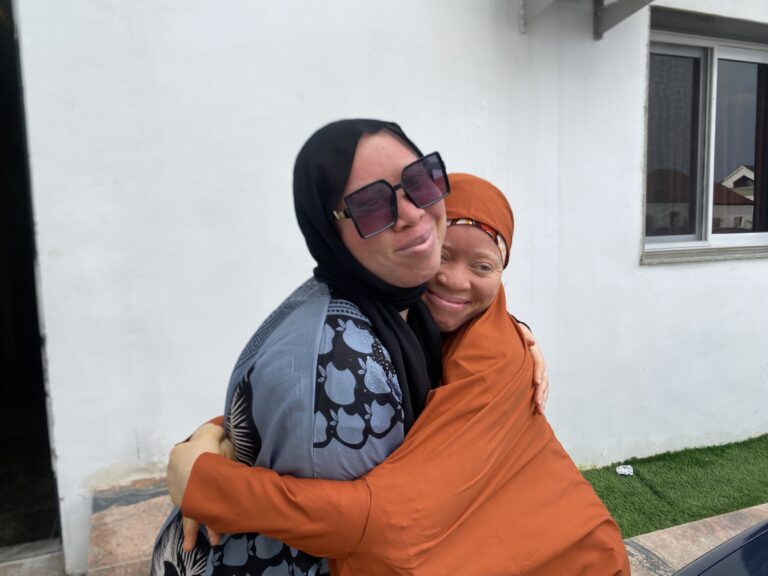By: Stephen Enoch
Fatima Usman battled with low self-esteem while growing up in the city of Kano. Burdened by stigma and judgmental gazes of people, she would lock herself in the house rather than join her agemates outside to play.
“I used to be scared of the stares I got when I went out,” she recalls as her eyes dazzle with pride.
Fatima was born with albinism, a genetic condition that affects the production of melanin, the pigment that gives colour to the skin, hair, and eyes. She is just as normal as any human being, but in this part of the world where she was born, people who look like her endure stigma, stereotypes, and dehumanisation.
However, she did not let what people think of albinism define her. She overcame low self-esteem and chased her dream with passion. Fatima pushed herself to excel academically by obtaining a BSc in Biochemistry at Bayero University, Kano. She found solace in writing as a teenager, and today she is a creative writer, poet, scriptwriter, and teacher.
She takes pride in her writing skills and professional qualifications. “Even if people don’t associate with me because of albinism, they know that if they want the best job done, they will look for me,” she stressed.
She is also educating people about albinism and how people with albinism are just as human as anyone else. She believes that much of the discrimination comes from ignorance.
“People genuinely don’t know. If you don’t come out to talk, people won’t understand, and the younger generation will have no role models to look up to”.
Failed Marriages, Due to Albinism
Fatima’s attempts at marriage have been unsuccessful. Over the years, she attracted suitors, but many of them walked away after initial excitement, unable to commit once confronted with societal prejudice against albinism.
What should have been moments of joy and anticipation repeatedly turned into silence, distance, and rejection, leaving her with emotional scars that were difficult to heal.
“I can remember 4 marriages that didn’t proceed because either the guy got discouraged or his family totally rejected our marriage plans because I am a PWD. As a lady, it is very painful, honestly,” She revealed.
One of her most painful experiences came when she found a suitor she was compatible with; someone she believed would stand by her regardless of societal bias. But when the young man introduced her to his family, everything changed. His parents, particularly his father, openly objected to the union.
“His father said I cannot marry their son because I will pollute their family gene with my Albinism. That was very painful. I cried on my bed, in my toilet, everywhere.
“How can someone say that kind of hurtful word to a person? Did I create myself? Is it my fault that I was born with Albinism? It wasn’t a good experience for a lady to go through, Fatima narrated.
Though the rejection was crushing, Fatima drew strength from it. She resolved to become the best version of herself.
“I have long moved on from that relationship, and I believe that things will definitely get better. While I am not putting pressure on myself, I am looking forward to many beautiful experiences that life has to offer me,” She added.
Fearless Rukayya
Rukayya Haruna, Fatima’s long-time friend, describes herself as fearless. She is the last of ten children, three of whom live with albinism.
She is an educator, facilitator, and entrepreneur who runs a clothing business, proudly wearing what she sells.
Unlike many others, she insists that the stigma and challenges she faces do not not define her reality.
She said, “I have always had self-esteem. Right from primary school to university, I was confident and proud of my intelligence.”
Family Tragedy With Cancer
Her strength, however, has been tested by tragedy. In 2022, she lost her elder brother, who also lived with Albinism, to skin cancer.
“He was sick for over a year, and we couldn’t raise money for his surgery on time. By the time we finally did, he had already passed. That experience broke me.
“The pain of losing him lingers, especially because it happened after we had managed to gather the ₦2 million needed for treatment.
“That experience showed me the vulnerability of persons with albinism and how our peculiar health crisis and high cost of care can be overwhelming,” She revealed.
Journey of Hope and Struggle
Bound together by a shared journey through the harsh realities, Fatima Usman and Rukayya Haruna draw strength from their friendship.
People with albinism often live with low vision and are highly vulnerable to sun-related health risks, especially skin cancer. Constant exposure to sunlight without adequate protection puts them at high risk of skin cancer.
For Fatima, Rukayya, and many living with albinism, sunscreen lotions, hats, umbrellas, and protective clothing are not luxuries. They are necessities for survival.
She explains that beyond skin conditions, many persons with albinism also deal with low vision. Together, these challenges make simple daily activities more complicated and expose them to additional vulnerabilities.

Fatima Condemns Comic Portrayal of PWA
For Fatima, advocacy is personal. She is weary of how albinism is often portrayed in comedy skits as a caricature or joke.
“Forget about those comedy skits. They do not represent us. We are good people, emotional people, and resilient people. The best shoe you can wear is empathy. Give people a chance to express themselves, and you may be surprised by who impresses you.
“The society must stop joking about persons with albinism. We are not objects for comedy,” she warned.
Advocacy
Rukayya is vocal about her philosophy on disability. She refuses pity and demands respect based on competence.
“I don’t advocate for empathy. I don’t want you to pity me. Look at my capacity and my potential. If I can do the job, give it to me. Don’t segregate me, but also don’t choose me out of pity, she stated.
Rukayya acknowledges that people often highlight her low vision and pale skin unnecessarily. To her, such focus misses the point.
“People should look beyond our disability and see our personalities. Judge us by what we can do, not how we look,” She added.
The experiences of Fatima and Rukayya illustrate the diverse realities of persons with albinism in Nigeria. While health challenges like skin cancer and low vision remain serious concerns, the greater battle often lies in breaking the chains of social stigma and systemic discrimination. However, the duo are thriving on the strength of their friendship.

